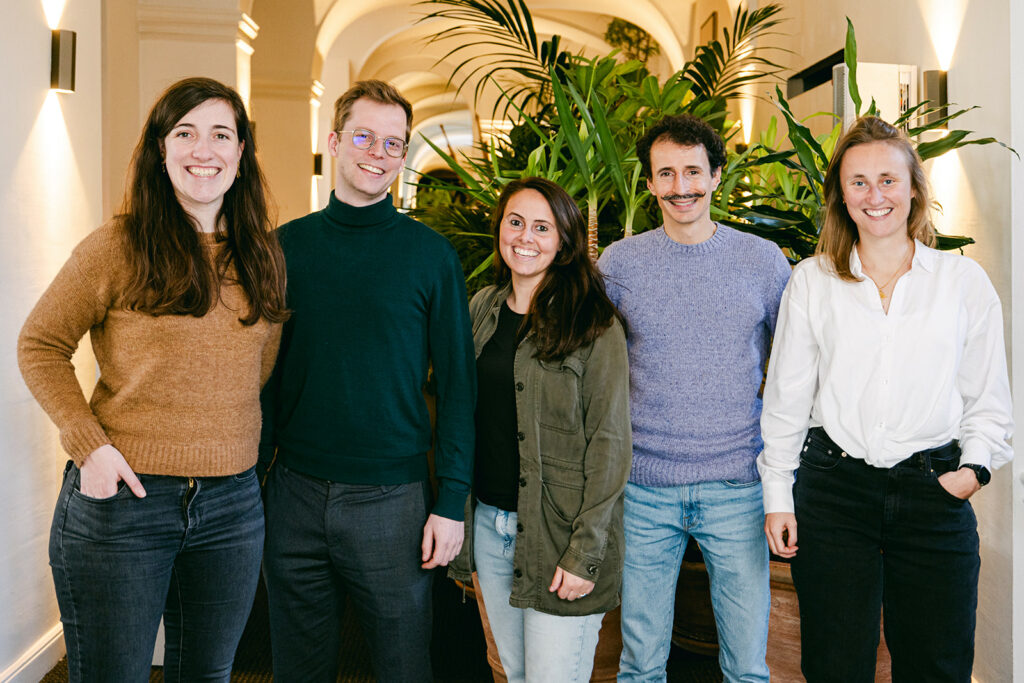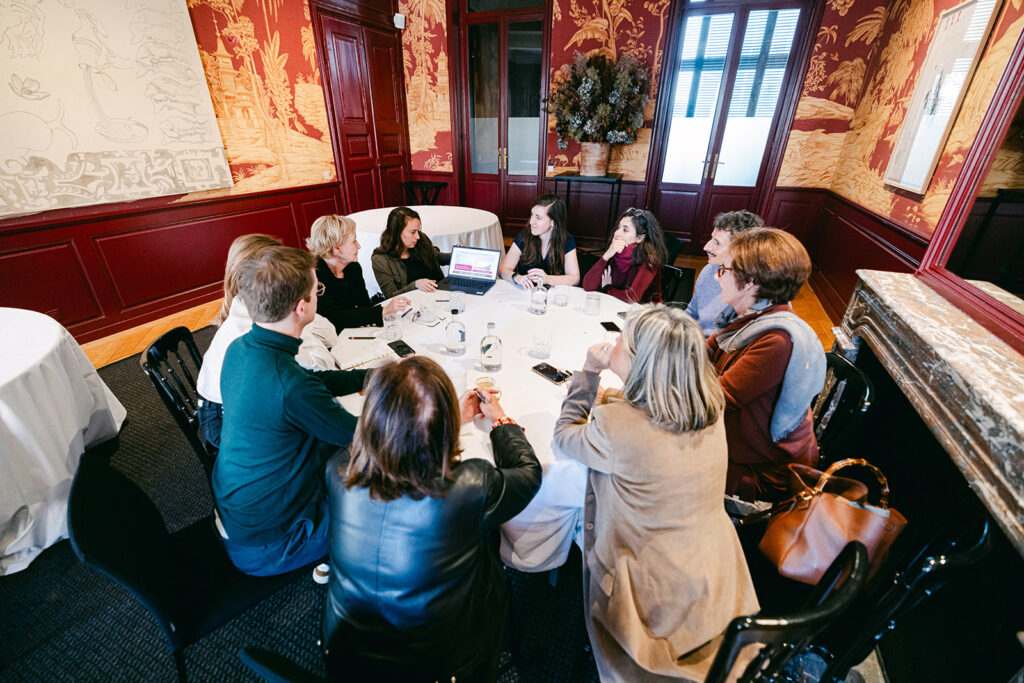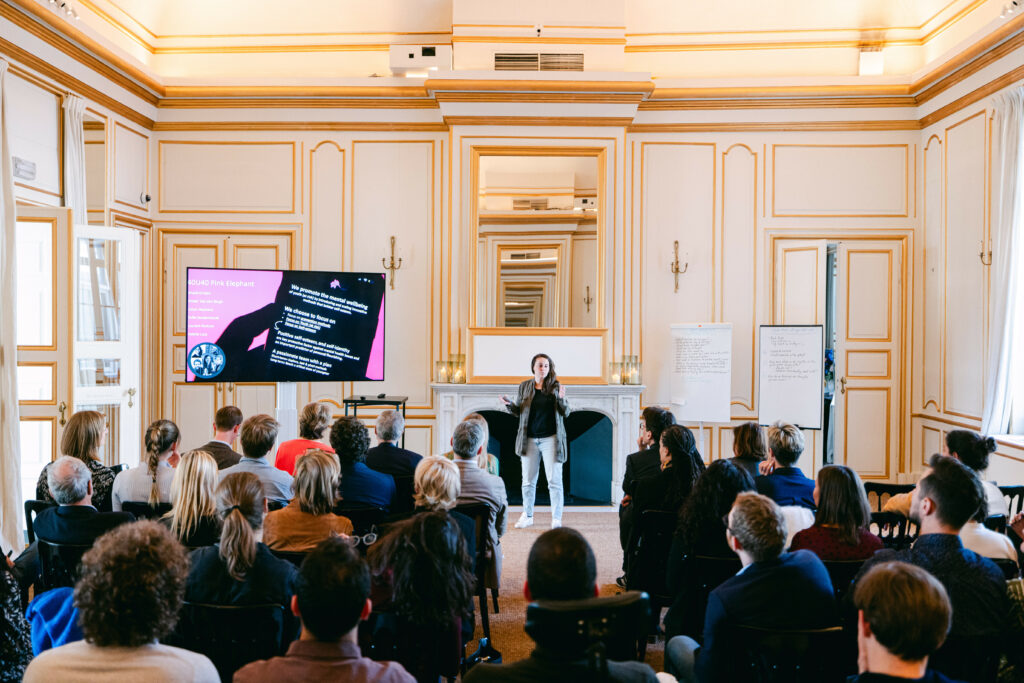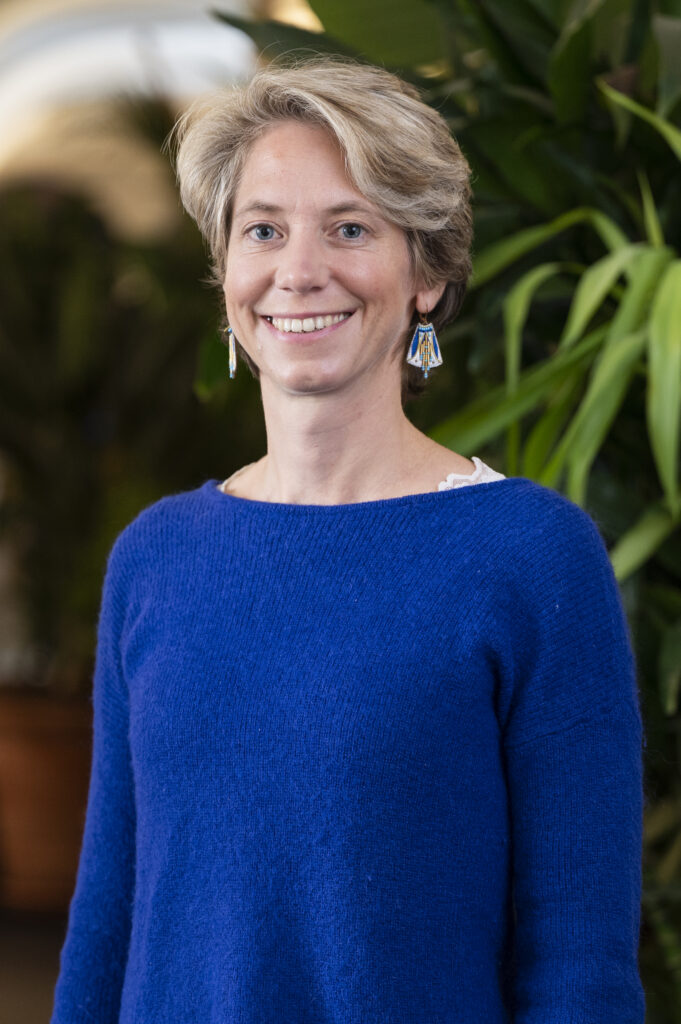Mental health: An omnipresent topic, hovering in plain sight yet too often swept under the rug. The more we try to ignore it, the more undeniable its presence becomes—like a glaring pink elephant in the room. This analogy inspired the name of the Pink Elephant Field Work Group, created by the Cohort 2023 Fellows Khalid El Hatri, Johan Heymans, Valérie Lucq, Laurent Pantusa, Kristel Van den Bergh, and Sofie Vandenhende. Recognizing the growing mental health challenges faced by young Belgians, the Fellows grouped together to explore critical questions such as how can we prevent mental health struggles among the youth? How can we empower them to build a strong self-esteem? Their mission took them into the field, connecting with organizations, engaging in conversations, and attending seminars and workshops. Along the way, they embarked on a journey, gaining new insights into mental health while evolving as leaders committed to societal impact.

The Fellows grouped together because they all felt the urgency to address this topic that remains under-discussed despite its importance. “We all had a clear interest in mental health, coming from different angles like personal struggles or being confronted with it through our professional life,” Valerie shares. She highlights the broader implications of individual wellbeing on society, stating, “We realized that contributing to this topic could act as an accelerator for addressing other societal challenges. When someone is struggling with their mental health, it’s not only difficult for them, it also impacts their environment. As a society, we are losing so much potential and richness when mental health issues go unresolved.” The decision to focus on mental health was thus quickly made, as was their choice to target youth. Young people represent an age group particularly vulnerable to mental health challenges, with struggles during this formative period often carrying significant consequences into later life. By addressing mental health early, the Fellows saw an opportunity to create a lasting, positive impact not only on individuals but also on society. With this mission in mind, the group embarked on what Johan describes as “a societal crusade and a personal path to learn more – not only about the issue of mental health, but also about ourselves.”
“We discussed our first steps during Forum 1 and went directly to work! First, we wanted to do desk research, going online and bringing up the statistics, reading articles, and selecting some headliners,” Valerie shares. “Then, we wanted to go out in the field. We wanted to talk to people who are related to mental health, which could be psychologists, coaches, people raising awareness through activism, or their social entrepreneurship.” Kristel and Johan followed mental health training on the prevention of burnout. Johan remembers that he followed the lighter version of that workshop, while Kristel followed the full training. “Our goal was to get a better understanding of burnout for ourselves, but also to see if we could use the tool they gave to help youngsters,” Johan shares.

The field exploration phase led to the emergence of ideas on how to help youth build self-esteem, one of them was engaging with them via a digital campaign. The group organized a workshop with a creative agency to learn more about their target audience and social media in relation to mental wellbeing. Choo Choo is a Generation Z-led marketing agency that offers communication services for target groups by co-creating with them. Together with the agency and youngsters from Young FENIX, the Field Work group brainstormed on what they wanted to achieve with their project and how. Young FENIX is an initiative founded by Field Work group member Khalid El Hatri, focusing on supporting and empowering young people through mental health awareness.
With the brainpower of these young adults and the support of the creative agency, the Fellows of Cohort 2023 gained new insights into social media, mental health, and what a feasible project could be. They also considered a printed campaign, with ideas like using stickers to raise awareness. Much like with the digital campaign, the group went through a process of exploration, figuring out how such a campaign would work, what the main objectives would be, and whom they wanted to reach.

For the Fellows of the Pink Elephant, the exploration of the field led to new learnings about the topic of mental health, as well as their own leadership and personal growth. These new insights became the most valuable part of the Field Work project for them. The workshop taught them what resonates with the next generation. Valerie shares her surprise: “I was struck by how similar we are to them; they share the same worries about mental health and are very aware of it. At the same time, we are so different. They mentioned platforms we had never heard of and told us when our ideas were not attractive to them and their peers.” For Johan, the importance of not imposing ideas from above became very clear during the workshop. “The youngsters expressed how much they appreciated that their voices were taken into account. They liked participating and being heard. When working on youth and mental health, we shouldn’t try to do things top-down; we should listen and involve them.” Valerie points out that the real value of going out into the field is to “explore and see things not with eyes set on the results, but with eyes of curiosity, with a desire to understand the other!”
Not just the workshop, but also the desk research, contact with organizations and people, and participation in mental health classes themselves, contributed to a transformative experience for the Fellows. Valerie shares her three key learnings from being in the field: “I learned about the magnitude of the problem and that the resources are not matching the needs. The role of self-esteem and how important it is as a predictor in later life, as well as during these teenage years. And I also learned a lot about organizations that already exist that I had no idea about!” Johan and Kristel embarked on a personal journey of new insights about themselves and others, thanks to the seminars they participated in. “The classes I took were practical and provided many tools that I thought we could use to help the youngsters,” Johan shares, highlighting what he learned about burnout for their project. Kristel shares how her learnings about mental health were steep, thanks to the Field Work project: “During the seminar, I witnessed people who had struggled for years make incredible changes right before my eyes. These powerful experiences introduced me to innovative methods for building mental resilience—some of which I now apply daily.”

Both Johan and Valerie value the importance of real-world engagement and conversations to enact social change. “The right mindset is crucial, curiosity and listening to understand each other! Doing the desk research is also important, checking the numbers, but then experience it, go out and see things for yourself,” Valerie encourages other societal leaders. Conversations will spark your light and inspire action, as Johan says: “Exploring and meeting people, that’s what gives you fire and energy to make things happen. The best experience I had from the Field Work project was the conversations with the group. I learned a lot from their views and ideas about the topic, but also from the people I spoke to in the context of the Field Work. It is an underestimated act to step out of your comfort zone, go out there from a learning perspective, and try to listen and understand. Without an agenda or expectations, just to see what the other person has to share; this was an enriching experience for me.”
By the end of the program, the main outcome of the Field Work for the Pink Elephant group was the learnings they gained about themselves and the topic they chose. The growth they experienced and the transformation they underwent continue to inspire them to help youth with their mental health struggles. For example, following a year of exploring this topic, Johan has joined the board of Young FENIX. In addition, the resources gathered through their thorough research are now available to future Cohorts who wish to work on the topic of mental health. Therefore, the Fellows finish the program not with an end product to present, but tales of a journey filled with learnings, strong connections and an enhanced understanding and commitment to societal impact on this topic.
We want to encourage the Fellows to explore the Field because the world is more complex than we often imagine. Linear thinking, where a problem leads directly to a solution, doesn’t work for societal impact. We need space for the emergence of new ideas. We need to open up, let new ideas flow and not follow past patterns. The exploration of the Field through observing and sensing with an open heart, mind, and will invites innovation and paradigm shifts. While the Pink Elephant group may not have had an immediate Field Work outcome, we can see an outcome in them as individuals.They will have a lot of impact in their own field and lives thanks to this personal journey. Societal change doesn’t always need to be direct; it can be indirect, and that is what we aim to foster.

| Cookie | Duration | Description |
|---|---|---|
| cookielawinfo-checkbox-advertisement | 1 year | Set by the GDPR Cookie Consent plugin, this cookie is used to record the user consent for the cookies in the "Advertisement" category . |
| cookielawinfo-checkbox-analytics | 1 year | Set by the GDPR Cookie Consent plugin, this cookie is used to record the user consent for the cookies in the "Analytics" category . |
| cookielawinfo-checkbox-functional | 1 year | The cookie is set by the GDPR Cookie Consent plugin to record the user consent for the cookies in the category "Functional". |
| cookielawinfo-checkbox-necessary | 1 year | Set by the GDPR Cookie Consent plugin, this cookie is used to record the user consent for the cookies in the "Necessary" category . |
| cookielawinfo-checkbox-others | 1 year | Set by the GDPR Cookie Consent plugin, this cookie is used to store the user consent for cookies in the category "Others". |
| cookielawinfo-checkbox-performance | 1 year | Set by the GDPR Cookie Consent plugin, this cookie is used to store the user consent for cookies in the category "Performance". |
| CookieLawInfoConsent | 1 year | Records the default button state of the corresponding category & the status of CCPA. It works only in coordination with the primary cookie. |
| elementor | never | This cookie is used by the website's WordPress theme. It allows the website owner to implement or change the website's content in real-time. |
| JSESSIONID | session | New Relic uses this cookie to store a session identifier so that New Relic can monitor session counts for an application. |
| wpEmojiSettingsSupports | session | WordPress sets this cookie when a user interacts with emojis on a WordPress site. It helps determine if the user's browser can display emojis properly. |
| Cookie | Duration | Description |
|---|---|---|
| lang | session | LinkedIn sets this cookie to remember a user's language setting. |
| li_gc | 5 months 27 days | Linkedin set this cookie for storing visitor's consent regarding using cookies for non-essential purposes. |
| lidc | 1 day | LinkedIn sets the lidc cookie to facilitate data center selection. |
| Cookie | Duration | Description |
|---|---|---|
| _ga | 1 year 1 month 4 days | Google Analytics sets this cookie to calculate visitor, session and campaign data and track site usage for the site's analytics report. The cookie stores information anonymously and assigns a randomly generated number to recognise unique visitors. |
| _ga_* | 1 year 1 month 4 days | Google Analytics sets this cookie to store and count page views. |
| _gat_gtag_UA_* | 1 minute | Google Analytics sets this cookie to store a unique user ID. |
| _gcl_au | 3 months | Google Tag Manager sets the cookie to experiment advertisement efficiency of websites using their services. |
| _gid | 1 day | Google Analytics sets this cookie to store information on how visitors use a website while also creating an analytics report of the website's performance. Some of the collected data includes the number of visitors, their source, and the pages they visit anonymously. |
| CONSENT | 2 years | YouTube sets this cookie via embedded YouTube videos and registers anonymous statistical data. |
| Cookie | Duration | Description |
|---|---|---|
| li_alerts | 1 year | Description is currently not available. |
| Cookie | Duration | Description |
|---|---|---|
| bcookie | 1 year | LinkedIn sets this cookie from LinkedIn share buttons and ad tags to recognize browser IDs. |
| bscookie | 1 year | LinkedIn sets this cookie to store performed actions on the website. |
| IDE | 1 year 24 days | Google DoubleClick IDE cookies store information about how the user uses the website to present them with relevant ads according to the user profile. |
| test_cookie | 15 minutes | doubleclick.net sets this cookie to determine if the user's browser supports cookies. |
| VISITOR_INFO1_LIVE | 5 months 27 days | YouTube sets this cookie to measure bandwidth, determining whether the user gets the new or old player interface. |
| VISITOR_PRIVACY_METADATA | 6 months | YouTube sets this cookie to store the user's cookie consent state for the current domain. |
| YSC | session | Youtube sets this cookie to track the views of embedded videos on Youtube pages. |
| yt-remote-connected-devices | never | YouTube sets this cookie to store the user's video preferences using embedded YouTube videos. |
| yt-remote-device-id | never | YouTube sets this cookie to store the user's video preferences using embedded YouTube videos. |
| yt.innertube::nextId | never | YouTube sets this cookie to register a unique ID to store data on what videos from YouTube the user has seen. |
| yt.innertube::requests | never | YouTube sets this cookie to register a unique ID to store data on what videos from YouTube the user has seen. |